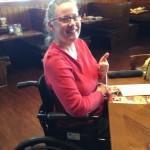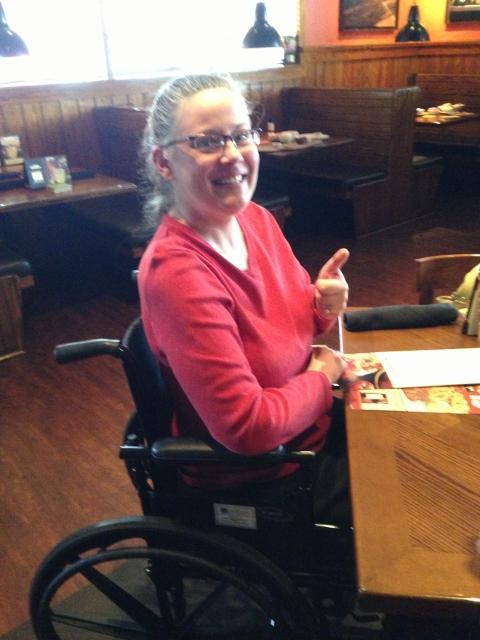
Big day for my
sister. Even something as simple as going out to eat is an
accomplishment for many people.
Are you tired of hearing about the Ice Bucket Challenge? I am too, but as the backlash started (and is continuing longer than it should), I couldn’t sit silent any longer. Because for me, it’s personal.
I’ve mentioned before that I recently had a family emergency, but without the details I’m sharing now: my sister was diagnosed with ALS late last year. After a huge number of tests and a second opinion from one of the top ALS doctors in the world, our story had a surprise and happy twist: she actually has a different, treatable neurological disorder that was merely mimicking the symptoms of a quickly progressing version of ALS.
We labored under the assumption that she had ALS for months, and made all the preparations for the steady decline that comes with that disease. Our prayers were answered, but most people aren’t so lucky.
I’m going to address some of the criticisms of the Ice Bucket Challenge in a moment, but first here are a few ALS facts I learned during our journey:
1. The vast majority of ALS patients will not live five years from their diagnosis date. Roughly half don’t make it past year three. No one knows why 10% of patients (like Stephen Hawking) live more than 10 years – these folks are the outliers.
2. 1 in 1,000 people will be diagnosed with ALS at some point in their lifetime. Many articles mention the number of people currently living with the disease – this makes it sound rarer than it is (sadly, as noted above, the high death rate makes the number living with the disease at any given time lower). In this connected age, many of us know more than 1,000 people. Chances are you will some day know someone with ALS, if you don’t already.
3. Because of the sad facts in #1, it is extremely difficult to do research studies and trials of patients to find effective treatments. Double-blind controlled drug trials are nearly impossible – the patients simply don’t live long enough for rigorous science. There are advancements being made, often the result of observational studies – the new comprehensive ALS Registry (which the ALS Association is helping to promote) will provide much-needed data for future studies.
4. People with ALS (or PALS, as they’re often called) are the bravest and most amazing people you’ll ever encounter. Many meet their daily challenges with humor – the message board signature of one fellow has always stuck with me: “You don’t need to be able to smile, to laugh.”
Responding to the Questions
Whether it’s jealousy or an attempt at newsjacking, many marketers and others have jumped on the bandwagon to criticize the Ice Bucket Challenge. But here’s the truth:
The Ice Bucket Challenge brings attention to a topic no one wants to talk about, and a sense of fun to a disease that has nothing fun about it.
I didn’t participate in pouring water over my head (we’re all free to take and leave such things as we see fit), and I’m a firm believer that it’s important to look closely at a charity before you send it your hard-earned money. So while investigations are warranted, here is my personal take on the top questions I’ve seen:
Who is the ALS Association and how can they possibly handle all this money?
When you or someone you love is diagnosed with ALS, your head is spinning. Everything in your world is about to change – forever. What do I need to know? Where can I get assistance and services? How will I pay my bills? Will I want to use a feeding tube? Will I go on a respirator? Will I need a nursing home?
For many, the ALS Association is a lifeline. I visited the Atlanta offices, where I was welcomed and introduced to each staff member (there were only four). To say their offices are modest is an understatement. This is not a high-flying, glamorous charity, and the generous and helpful spirit of everyone there is something I’ll never forget. There’s a big ALS clinic at Emory University, and representatives of the local ALS Association are present there every Friday – the day many patients are diagnosed each week – to provide immediate support and guidance.
Because the Ice Bucket Challenge was truly a grass roots phenomenon, as a PR pro I thought the ALS Association initially seemed less than prepared to handle all the attention. I find that understandable. They’ve now made statements and provided additional information to clarify and address some of the misinformation out there (they do, in fact, fund research for example).
I don’t have personal experience with how they manage their finances, but I do have very personal experience with the PALS-facing activities of this organization, and they are phenomenal.
“They’ve raised $15,000+ for every person who will be diagnosed this year!”
Does that sound like a lot of money to you? I can assure you, it’s a drop in the bucket compared to the financial hardships a family caring for someone with this disease endures. Just a motorized wheelchair of the type an ALS patient needs costs $30,000+. PALS need tools and assistance for everything from grooming to feeding to (eventually) breathing. Some of it is covered by insurance, but much of it is not.
This was all about the ego of the participants.
Um, so what? Let people’s egos be responsible for something good for a change!
People participating don’t actually care about ALS.
That could be true in some cases, but when I see everyone from politicians to business leaders to my friends’ kids talking about (and donating to) ALS, it’s hard for me to see anything bad about it.
The ALS Association funds studies using embryonic stem cells.
Most of the promising research for ALS uses adult stem cells especially those created using a patient’s own skin cells. However “most” is not “all,” and as with spinal cord injuries, some embryonic stem cell research is funded. Those with strong objections to this practice have a valid reason to give their charity donations elsewhere.
The Ice Bucket Challenge wastes water.
I’m an ecologically-minded person, but this one seems silly to me. It’s summer time! Kids play in the water hose, swimming pools are filled with water, Slip N’ Slides are deployed. If you’re opposed to all of those things then it makes sense that you would have a problem with the Ice Bucket Challenge, but otherwise it seems misguided.
How can other organizations replicate the ice bucket challenge?
You can’t. Despite a plethora of blog posts stating otherwise, it was lightening in a bottle that no one can predict or replicate. But there are elements worth study, and wise non-profit authorities developing theories on why the response was so great.
Why do I think there was a backlash? Because, unfortunately, in a world where everyone’s looking to create content and get traffic, virtually every positive big story goes through a similar arc: first the accolades, then the naysayers, then people criticizing the naysayers, followed by the re-caps. I usually try to avoid such nonsense, however I recognize this blog post is somewhere between phase three and phase four. J
But hopefully you’ll indulge me because, as I’ve said, for me it’s personal.
[ts_fab authorid=”1″]


Kellye, thanks for sharing your story. In my view, it should be personal for all of us. Whether or not we have experience with ALS it is a disease that has a profound impact on the affected and their families. Anyone who has ever faced a scary illness will understand that associations can be a much needed lifelline that guide you through the storm. It saddens me that so many have silly criticisms about the ice bucket challenge. Thank you for raising awareness and reminding us why this was important.
What a beautifully-written, informative post. Thanks Kellye.
Thank you, Karen – and thank you for being right by my side during the thick of the situation. You’re an amazing colleague and friend!
Thank you for reading and commenting, Alison – nice to know you found it worthwhile!
Thanks, Kellye, for sharing your personal story along with some very
useful information and wise commentary. I lost my dear friend Mary to
ALS in August of 2009, and now my friend Linda is suffering from the
disease. Mary, whose ALS started in her lower extremities, lasted five
years from her diagnosis to her death. Linda, whose disease has begun in
her upper body, is much less likely to last that long. In less than a
year, she has lost both her ability to talk and her ability to swallow.
In both their cases, the ALS Association has been a godsend to my
friends AND to their families/friends/caregivers. I am so happy for you
that your sister got the good news she did; for those not so fortunate, I
am glad that the ice-bucket challenge has raised some much-needed
awareness and funds for those facing a truly terrible disease.
Thank you for your kind words, Kathy. I’m so sorry to hear of your loss, and for the struggle your friend Linda is going through now. It is a ruthless disease, and I salute everyone who meets each day with bravery and grace! I think all of us who have been personally touched by ALS have a positive reaction to the Ice Bucket Challenge – which says a lot, doesn’t it?